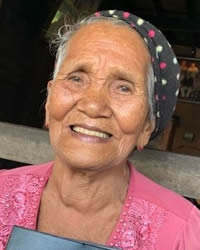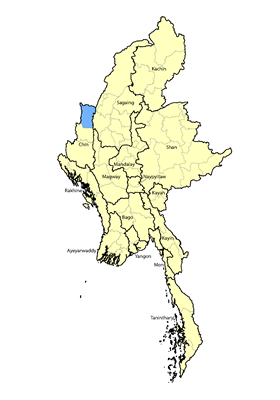Confusion exists regarding the name of this people group. Most Christian sources, including the Ethnologue, have called them Bualkhaw for many years, and other groups in the area may know them by that name. Bualkhaw, however, is the name of their primary village, but the name of both their ethnic group and language is Phadei. When this group translated the Bible into their language in 2022, they proudly put “Phadei” on the cover.
Location: With a population of 15,000 people, the Phadei tribe inhabits a mountainous area north of Falam Township in the northern part of Myanmar's Chin State. Their three main villages are called Bualkhaw, Phaizawl, and Khuang. Phadei territory is surrounded by several other Chin groups, including the Ngawn to the north, the Sim to the west, and the Tapong and Zanniat to the south.
Language: Phadei is part of the Falam branch of Chin languages, although most people struggle to comprehend Falam due to their geographic isolation. Phadei enjoys vigorous use within their communities, although most people can also understand the national language, Burmese.
For centuries, the Phadei people lived simple lives in their villages, which had limited access to the outside world. In the past, hunting was required to secure food, but in recent decades the number of wild animals in the area has diminished as the human population increased and more forest was cleared.
The Phadei are an impoverished community with few modern conveniences. Most families are engaged in growing simple crops and raising animals. Their communal life now revolves around the church, as Christ has given them a new identity and purpose in life.
Like almost all other tribes in Chin State, countless generations of Phadei people were animists, living in fear and slavery to the spirit world. The Gospel was first preached to the Phadei in 1907, and people gradually surrendered their lives to Christ. Alas, over a century passed without the Phadei having the Scriptures in their language. They used the Falam Chin Bible, but as it was not their “heart language,” many people struggled to understand God's precepts. After praying for their own Bible since 1948, Pastor Cong Sum translated the New Testament from the English King James version into Phadei in 2010. A mission group recalled: “Printing in the Phadei language was a long journey. The first few copies were very thick and heavy (over 4 lbs!) with very poor print quality. And the expense was more than most could afford. There are at least 15,000 believers (all Phadei people are Christians) and they can all read their own language.”
After having tasted the wonders of God's Word in their own language, the Phadei commenced work translating the rest of the Bible, which they completed in 2022. One of the greatest days in Phadei history occurred when the shipment of 15,000 full Phadei Bibles arrived. The Bible League Canada reported: “Thanks to your support, 15,000 lightweight Bibles in the Phadei language, complete with hymnals, were delivered to Chin State. Daw Sung, Secretary of the Phadei Christian Women Fellowship, shared the events leading up to a day of great rejoicing: “I was born and brought up in my Christian family. My life is happy, serving the Lord wherever I can. The only point of sadness in my life was that I had no Bible in my language…. Phadei leaders had prayed for this long before I was born, and after more than 60 years, God answered their prayers! Today is a blessed day for me because I received the most precious gift of all: a Bible in the language of my heart…. There may be many false teachings in our country, but we Phadei people will know the truth by reading our very own Bibles! This is an amazing miracle to us. May the Lord bless you!”
Scripture Prayers for the Phadei in Myanmar (Burma).
| Profile Source: Asia Harvest |











